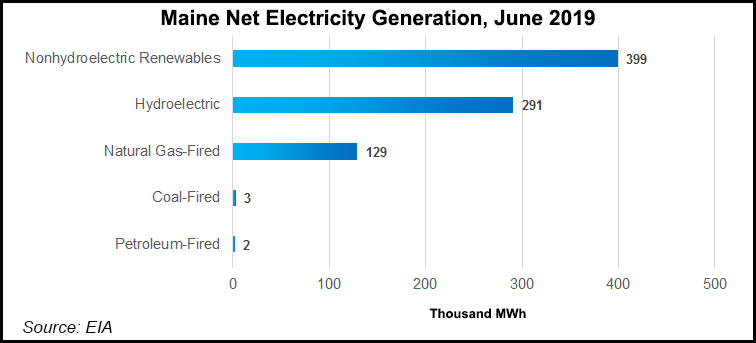Regulatory | NGI All News Access
Companies, States Joining Aggressive Carbon Neutrality Plans
States across the nation and private companies continue to advance ambitious climate protection plans, with Amazon and Maine among some of the latest pledging carbon neutrality within 25 years.

Amazon, the online retail giant that delivers 10 billion items annually and is a leading U.S. employer, said last week it would work to achieve net-zero carbon across its operations by 2040, 10 years earlier than a target as called for in the United Nations (UN) climate accord, aka the Paris Agreement. Amazon, the first signatory of The Climate Pledge, called on others to join the initiative. The company, one of the largest and most valuable in the world, disclosed for the first time that its greenhouse gas emissions were not insignificant at 44.4 million metric tons last year.
“We’re done being in the middle of the herd on this issue — we’ve decided to use our size and scale to make a difference,” said CEO Jeff Bezos, adding that if a company as large as his can try to meet the pledge, “then any company can.”
The plan is one of the most aggressive corporate targets yet set, especially for a company that relies heavily on fossil fuel-hungry vehicles and aircraft, as well as energy-intensive data centers across the world. To advance its goal, Amazon has ordered 100,000 electric delivery vehicles from Rivian, a company it invested $440 million in earlier this year.
Along with Amazon, others that make the pledge would measure and report their greenhouse gas emissions and implement decarbonization strategies in line with the Paris Agreement, including efficiency improvements, renewable energy and materials reductions.
Two years ago, Amazon committed to powering its global infrastructure with 100% renewable energy. The company now is committed to reach 80% renewables by 2024 and 100% by 2030.
Maine Democratic Gov. Janet Mills also pledged on Monday at the UN climate summit that the state’s economy would be carbon-neutral by 2045. She issued an executive order directing her recently formed climate council to make recommendations to meet that goal by late next year.
With the pledge, Maine joins other New England states in strengthening its stance against fossil fuels. About 75% of net electricity generation in Maine came from renewable energy resources such as hydropower and wind last year. The state is also a member of the Regional Greenhouse Gas Initiative, a market based program in the Northeast to cap and reduce carbon dioxide emissions.
Mills signed legislation in June for the state to generate 100% of its electricity from renewable resources and cut emissions by 80% by 2050. The latest goal is still a tall order, however, as nearly two-thirds of households in the state use fuel oil as the primary energy source for heating, a larger share than in any other state, according to the Energy Information Administration. While there’s a lack of natural gas transmission and distribution infrastructure in Maine, fuel oil use has actually declined over the last decade with more consumers turning to propane and natural gas. The state would also still need to curb significant emissions from the transportation sector.
The announcements are the latest in a series from other cities, states, companies and utilities across the country aiming to curb emissions, produce more energy with alternative resources and reduce fossil fuel consumption.
Microsoft said on Tuesday it would purchase 230 MW of renewable energy from two projects in Texas under a solar and wind energy power purchase agreement with Engie, boosting its renewable portfolio to more than 1,900 MW.
Also of note, energy holding company Duke Energy is committing to net-zero carbon emissions by 2050, while Virginia announced similar goals prior to that. Even some of the largest global oil and gas producers are backing decarbonization efforts or rolling out initiatives, including 13, which on Monday launched initiatives that include slashing emissions at industrial hubs to better support the Paris Agreement.
© 2024 Natural Gas Intelligence. All rights reserved.
ISSN © 1532-1231 | ISSN © 2577-9877 |
